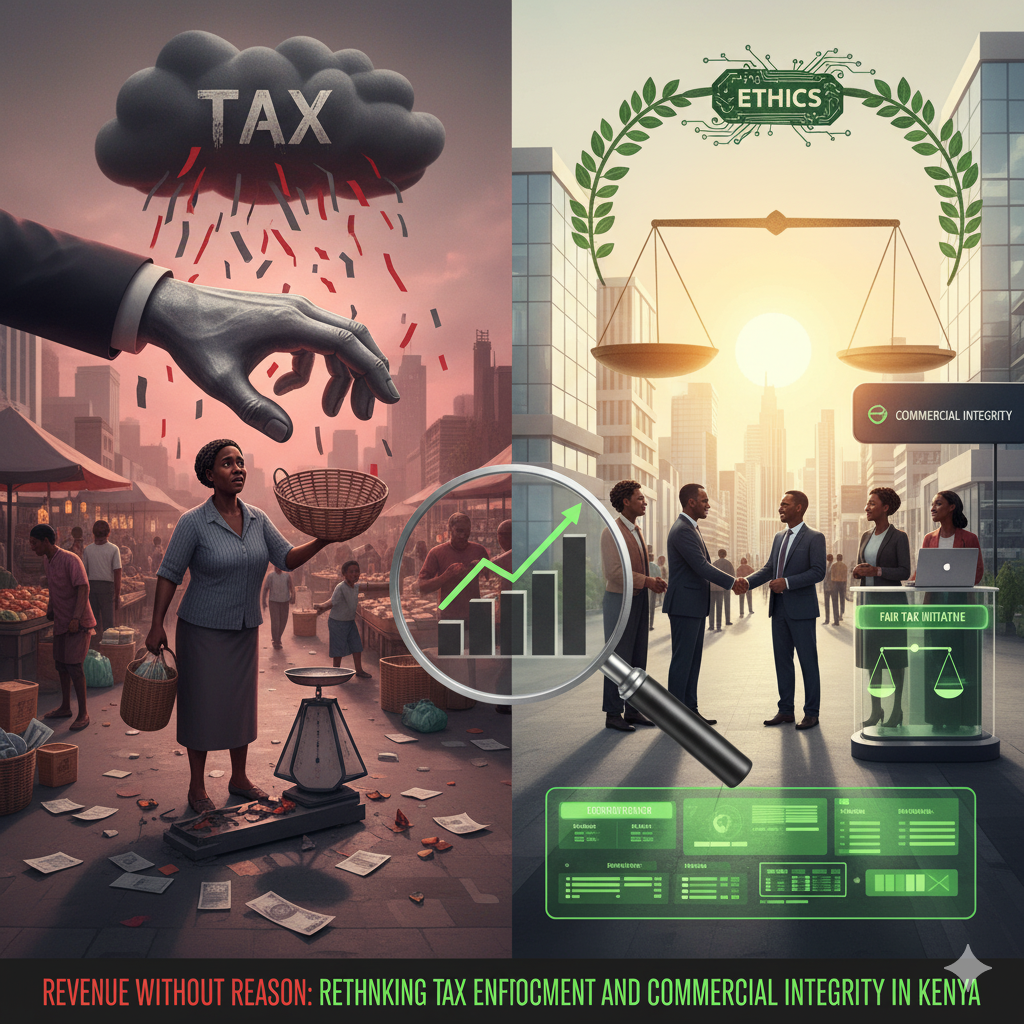Introduction
“The power to tax is the power to destroy when exercised without thought, structure, or vision.”
What if tax enforcement didn’t just collect revenue—but slowly, quietly, and systematically weakened the very businesses it was meant to support?
When taxation is rolled out without strategic foresight, legal clarity, or thoughtful design, the consequences go far beyond revenue inefficiencies. They disrupt commercial ecosystems, distort competition, and erode trust.
The High Court’s judgment in Kamau & 33 Others v Commissioner General, KRA & Another [2025] KEHC 9039 (KLR) exposed some of these cracks. Although the case was dismissed on procedural grounds, it highlighted the urgent need to rethink how Kenya approaches tax enforcement—especially for micro-enterprises.
Why This Case Matters
This case is a canary in the coal mine. It illustrates that:
- Ambiguous laws + aggressive enforcement = commercial risk
- Poor procedural choices = lost cases, even when arguments are valid
- Tax pressure without strategy = fewer compliant businesses
While the petition was dismissed for failure to exhaust remedies under the Tax Appeals Tribunal Act, it underscored the pressing need for coherence between tax policy, enforcement practice, and accessible legal redress.
The Digest: What Happened?
In Kamau & 33 Others, a group of small-scale water refilling business owners challenged a KRA public notice issued on 17 July 2020. The notice classified water refilling—dispensing purified water into customer-provided containers—as “manufacturing” under Section 2 of the Excise Duty Act. KRA required such businesses to obtain excise licenses, affix excise stamps, and remit duty under Section 5.
The Petitioners’ position:
- Their operations did not involve purification or bottling.
- They purchased already purified water from licensed producers and resold it directly through vending machines.
- KRA’s actions—shop closures, asset seizures, and fines—violated constitutional protections under Articles 10, 27, 40, 47, 201, and 210.
KRA’s defense:
- Refilling amounted to “packaging,” and therefore fell within excisable activities.
- Petitioners had previously signed compounding agreements under Section 109 of the Tax Procedures Act, showing admitted liability.
- The doctrine of exhaustion applied: the matter should have been taken to the Tax Appeals Tribunal (TAT), not the High Court.
The Court’s finding:
The High Court agreed with KRA. While acknowledging constitutional dimensions, it held that the dispute arose from tax administration and should have been filed at the TAT. The petition was dismissed for want of jurisdiction.
The result: procedurally sound, but substantively unresolved questions around proportionality, fairness, and clarity in tax enforcement.
Implications
1. Regulation Without Design Hurts Everyone
KRA’s attempt to redefine “manufacture” via public notice—without a firm legislative basis—undermines certainty and predictability. It risks administrative overreach and violates Article 210(1) of the Constitution, which requires that no tax may be imposed except as authorized by law. Without clarity, businesses cannot plan, and enforcement becomes arbitrary.
2. Poor Litigation Strategy = Lost Causes
By filing directly at the High Court, Petitioners fatally weakened their case. This is not unique—many taxpayers (and sometimes lawyers) misfile tax disputes, costing time, money, and credibility.
Lesson: Even the strongest legal arguments collapse if pursued in the wrong forum.
3. Over-Enforcement Distorts Economies
Micro-enterprises such as water vendors cannot sustain the cost of complex compliance regimes. Heavy-handed enforcement shrinks the tax base, erodes tax morale, and harms long-term revenue prospects. An inflexible model benefits neither Treasury nor taxpayer.
4. A Window for Systemic Realignment
Despite dismissal, this case opens the door to reform. It highlights the need for harmonization between legal definitions, administrative practice, and accessible dispute resolution.
Recommendations
- Clearer Law
Amend the Excise Duty Act to define “manufacture” and “packaging” more precisely, particularly in resale or vending contexts. Draw on public consultation and comparative frameworks for consistency and fairness. - Procedural Literacy
The Judiciary, KRA, and LSK should collaborate on targeted CPD sessions and outreach to explain jurisdiction under the Tax Appeals Tribunal Act. Improved procedural literacy will reduce premature filings and enhance efficiency. - Tiered Compliance for Micro-Enterprises
Adopt threshold-based models similar to turnover tax. Options include simplified licensing, onboarding support, and tailored grace periods for high-volume, low-margin businesses. - Institutional Litigation Gatekeeping
KRA and the Attorney General’s Office should conduct internal constitutional compliance audits before litigating contested enforcement measures. Pre-litigation assessments could reduce unnecessary clashes and strengthen state credibility. - Private Sector Readiness
Businesses, especially SMEs, should institutionalize tax and legal advisory support. Industry associations and cooperatives can host compliance clinics, build early-warning systems, and provide subsidized advisory services.
Conclusion
Kamau & 33 Others illustrates that taxation is not merely about raising revenue—it is a governance tool with profound legal, commercial, and constitutional consequences.
When enforcement outpaces legal clarity, and when litigation bypasses procedure, both the state and the taxpayer lose. The way forward is not to shield businesses from compliance, but to ensure that law, enforcement, and adjudication remain aligned. Only then can taxation function as a legitimate, predictable, and sustainable lever of national development.
Need Help Navigating Compliance or Dispute Risks?
If your business faces uncertainty in tax classifications or enforcement, our team can help. We provide SMEs, associations, and regulated businesses with structured legal advice, compliance clarity, and dispute strategies to protect operations before problems escalate.
Authors:
Waithira Mugo (Tax Lawyer) & Mike Ogutu (Commercial Lawyer)
📩 Contact: info@ithera.africa
Disclaimer: This article is intended for general guidance only and does not substitute professional advice. While due diligence has been exercised, Ithera Africa accepts no liability for actions or omissions arising from reliance on this content.
